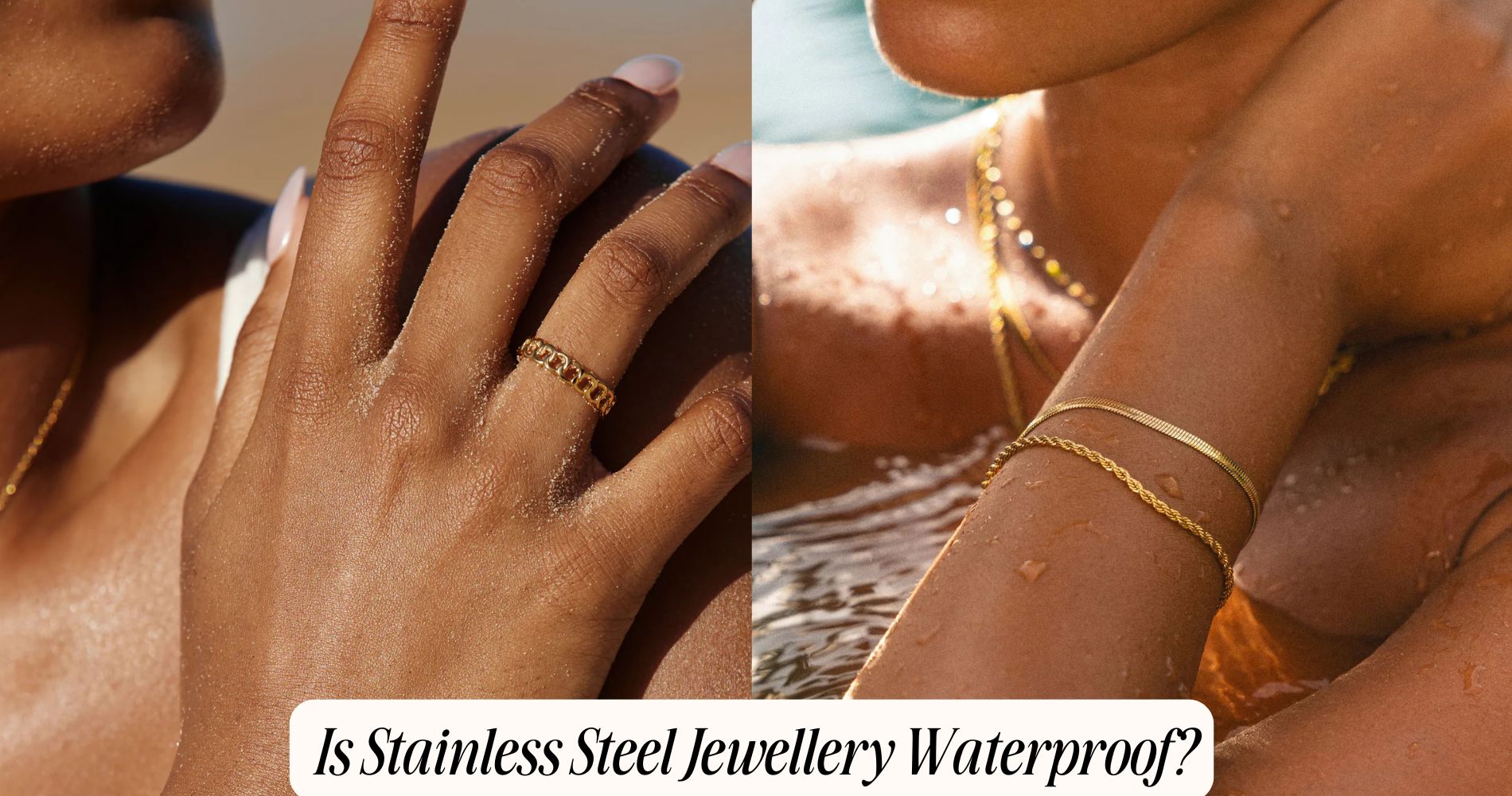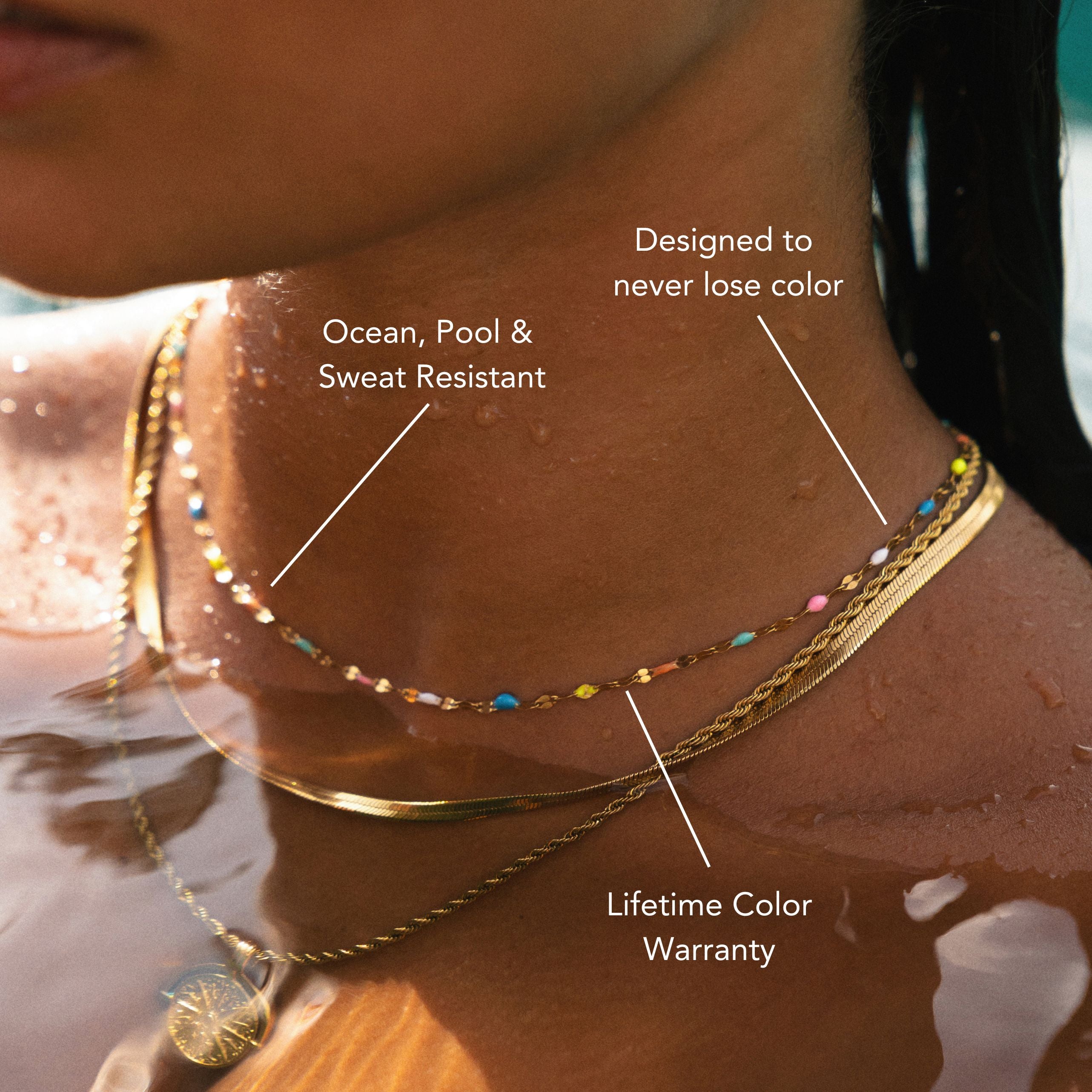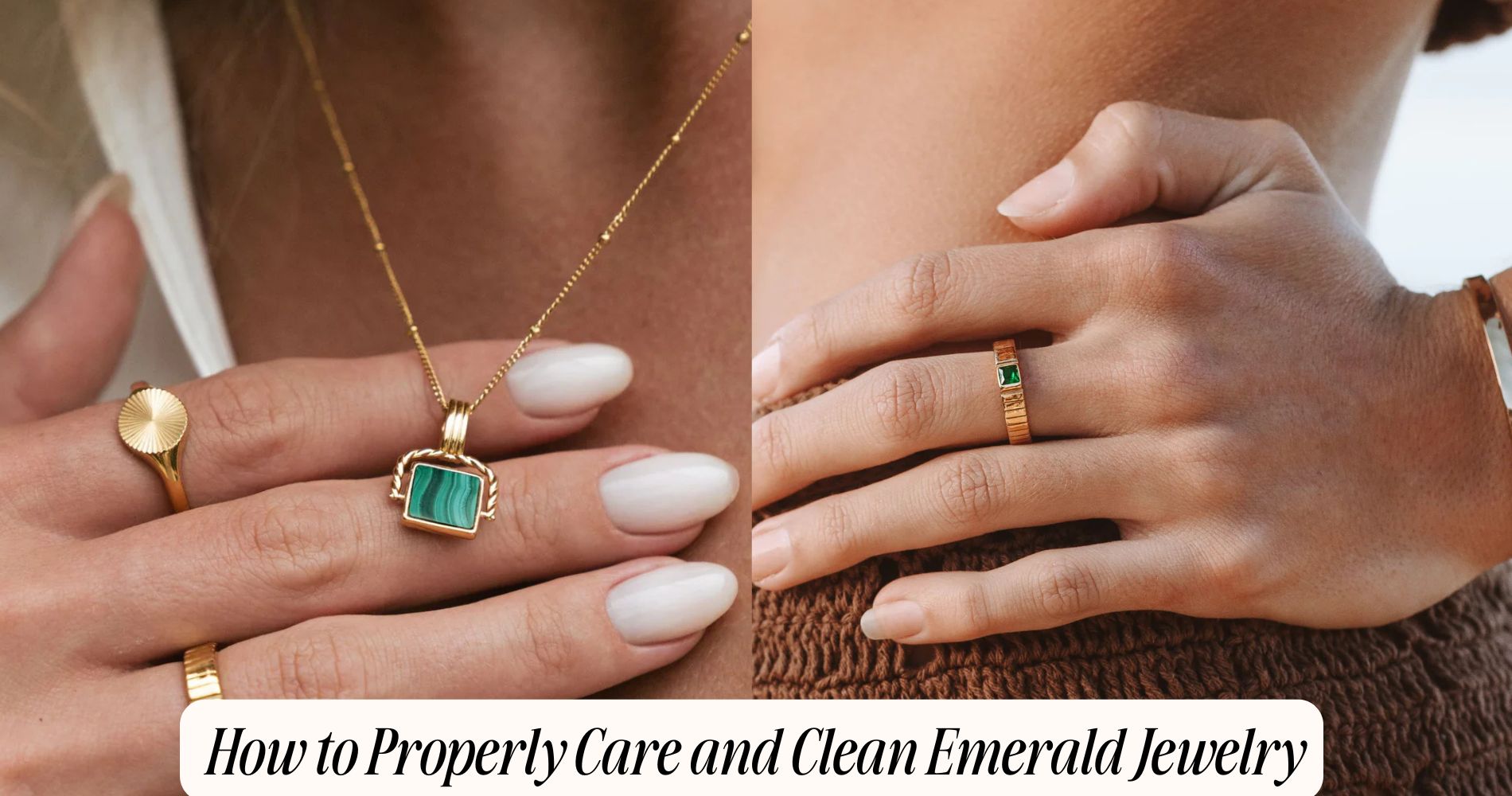
Is Stainless Steel Jewellery Waterproof?
Is stainless steel jewelry waterproof? While it’s not completely waterproof, stainless steel jewelry does offer excellent water resistance for everyday wear. Its chromium content makes it resistant to corrosion, so a little moisture isn’t a big concern. However, prolonged exposure to water—especially saltwater or chlorinated water—can lead to degradation over time. To keep your pieces in top condition, avoid wearing them while swimming or bathing, and always wipe them down after use before storing them properly. For durable and stylish options, check out the anti-tarnish jewelry collection, crafted to maintain their shine even with frequent wear.
Understanding Stainless Steel
When it comes to jewellery, many people appreciate the durability of stainless steel. You mightn't realize that its composition plays a vital role in its strength and resistance to corrosion. Stainless steel typically contains iron, chromium, and nickel, creating a robust alloy that can withstand daily wear and tear. This unique blend makes it an ideal choice for those who want a long-lasting piece of jewellery without compromising on style.
Stainless steel applications extend beyond just jewellery. You'll find it in kitchenware, medical instruments, and even construction materials. This versatility stems from its ability to resist rust and tarnishing, making it a popular option in various industries.
When you wear stainless steel jewellery, you're not just choosing a fashionable accessory; you're opting for a material that's proven to endure the test of time.
With its appealing finish and range of designs, stainless steel jewellery often fits seamlessly into your everyday wardrobe. So, when you're considering your next piece, remember the benefits of stainless steel and how its composition positively influences its applications in both fashion and function.
Properties of Stainless Steel
The properties of stainless steel make it an exceptional material for jewellery. One of the standout features is its alloy composition, which typically includes iron, chromium, and nickel. This combination creates a durable and resistant material that holds up well over time. You're likely to appreciate how stainless steel maintains its shine and luster, even with regular wear.
Another key property is its corrosion resistance. Unlike other metals, stainless steel doesn't easily tarnish or rust, making it perfect for everyday pieces. You won't have to worry about your jewellery losing its appeal due to exposure to moisture or humidity.
Additionally, stainless steel is hypoallergenic, which is great news if you have sensitive skin. You can wear it comfortably without the fear of irritation.
The strength of stainless steel is also remarkable. It can withstand impacts and scratches better than many other materials, ensuring that your jewellery remains in excellent condition.
Waterproof vs. Water-Resistant
When you hear the terms waterproof and water-resistant, it's easy to assume they mean the same thing, but they don't.
Waterproof refers to items that can completely resist water penetration, while water-resistant items can withstand some exposure without damage.
For instance, a waterproof watch can be submerged in water, while a water-resistant jacket might handle light rain but not a downpour.
Definitions of Each Term
Often confused, the terms "waterproof" and "water-resistant" describe different levels of protection against moisture. When you hear "waterproof," it means that a product is impervious to water. In the context of jewellery types, this implies that the piece can withstand being submerged in water without any damage, making it ideal for swimmers or those who work in wet environments.
On the other hand, "water-resistant" indicates that the item can resist moisture to a certain extent but isn't entirely impermeable. For instance, a water-resistant piece may handle occasional splashes or light rain but shouldn't be worn while swimming or showering.
When shopping for jewellery, understanding these definitions helps you select pieces that match your lifestyle and the material qualities of the jewellery.
Stainless steel, for example, often comes with varying degrees of water resistance, depending on its finish and design. Knowing these distinctions allows you to make informed decisions, ensuring that your jewellery can keep up with your daily activities without compromising its integrity.
Everyday Examples Explained
Understanding the difference between waterproof and water-resistant items can save you from unexpected disappointments. When it comes to everyday wear, it's crucial to know what you're getting.
For instance, a water-resistant watch can handle splashes and brief exposure to water, but it's not designed for swimming or plunging. If you're wearing it while washing your hands, you're likely fine. However, if you jump into a pool, you might end up with a damaged watch.
On the other hand, waterproof items, like certain stainless steel jewelry, can withstand submersion and heavy exposure to water without any harm. This makes them perfect for those who want to keep up with fashion trends without worrying about their accessories.
When choosing jewelry for everyday wear, consider how much water exposure you'll have. If you're likely to encounter moisture regularly, opt for waterproof options.
Otherwise, you may want to stick with water-resistant pieces that fit your style but can handle some splashes. Understanding these distinctions guarantees you make informed choices and enjoy your jewelry without unnecessary concerns.
Effects of Water Exposure
When you wear stainless steel jewelry, it's important to understand how water exposure affects its properties.
While stainless steel is known for its corrosion resistance, prolonged exposure to water can still impact its long-term durability.
Knowing how to care for your jewelry will help you maintain its shine and integrity over time.
Corrosion Resistance Properties
The resilience of stainless steel jewellery against corrosion makes it an ideal choice for those who enjoy wearing accessories in various environments, including water. The primary reason for this durability lies in its unique composition, which includes chromium. This element forms a thin, protective layer on the surface, effectively blocking corrosion mechanisms that can arise from exposure to moisture and other elements.
When stainless steel comes into contact with water, it's less prone to rust and corrosion compared to other metals. Even in salty or chlorinated water, its protective coatings work hard to fend off potential damage. While you might think that prolonged exposure could compromise your jewellery, stainless steel's inherent resistance markedly reduces the likelihood of issues arising.
However, it's important to remember that not all stainless steel is created equal. Some lower-quality pieces may lack sufficient protective coatings, making them more vulnerable. To guarantee longevity, opt for high-grade stainless steel, which will offer superior corrosion resistance.
With proper care and maintenance, you can keep your stainless steel jewellery looking great, enjoying its beauty without the worry of corrosion.
Long-term Durability Factors
Although stainless steel jewellery is known for its corrosion resistance, factors such as water exposure can still impact its long-term durability.
While stainless steel can withstand moisture better than many other materials, prolonged exposure to water can introduce longevity factors that may affect its appearance and integrity over time.
Environmental influences, such as saltwater or chlorinated water, can accelerate wear and tear. If you frequently wear your jewellery in these conditions, you might notice a change in shine or even the development of pitting or discoloration.
Even freshwater can lead to gradual deterioration if your jewellery isn't dried properly afterward.
Additionally, the presence of soaps, lotions, or perfumes can contribute to the degradation of the jewellery's surface. These substances can create a film that traps moisture, leading to potential rust spots or tarnishing.
To guarantee your stainless steel jewellery lasts, it's important to be mindful of these factors.
Care and Maintenance Tips
Understanding how water exposure affects stainless steel jewellery is key to its care and maintenance. While stainless steel is resistant to rust and corrosion, prolonged exposure to water can lead to tarnishing or dullness.
To keep your pieces looking their best, employ effective cleaning techniques. After wearing your jewellery, gently wipe it with a soft, dry cloth to remove moisture and prevent tarnish buildup. For deeper cleaning, use mild soap and warm water, then dry thoroughly.
Storage solutions also play an essential role in maintaining your jewellery's shine. Store your pieces in a dry place, preferably in a lined jewellery box or a soft pouch, to prevent scratches and exposure to humidity. If you plan to store them for an extended period, consider using silica gel packets to absorb any moisture.
Caring for Stainless Steel Jewellery
Caring for stainless steel jewellery is easier than you might think. With just a few simple steps, you can keep your pieces looking shiny and new.
Start by using effective cleaning techniques. A mild soap solution and a soft cloth work wonders for removing dirt and grime. If you notice any stubborn spots, you can use a soft-bristled toothbrush to gently scrub those areas. Rinse well and dry immediately to prevent water spots.
When it comes to storage solutions, think about protecting your jewellery from scratches and tarnishing. Consider using a soft pouch or a lined jewellery box. Avoid storing your stainless steel pieces with other metals, as this can lead to scratches.
If you're traveling, pack your jewellery in a dedicated compartment to keep it safe.
Lastly, try to avoid exposing your stainless steel jewellery to harsh chemicals, like bleach or chlorine, as they can affect the finish.
Common Misconceptions
Many people hold misconceptions about stainless steel jewellery, especially regarding its durability and care. One common myth is that stainless steel is indestructible. While it's highly resistant to tarnishing and scratches, it can still suffer damage from harsh chemicals or excessive force.
Myth debunking is essential here, as you should recognize that, like any material, it requires some level of care and attention to maintain its appearance.
Another misconception is that stainless steel jewellery is completely waterproof. While it can withstand exposure to water better than many other materials, it's not immune to corrosion if submerged for prolonged periods or exposed to saltwater.
Consumer awareness about these limitations is significant for making informed decisions.
Lastly, many believe that stainless steel jewellery is only available in a basic silver color. In reality, you can find it in various finishes and colors, including gold and rose gold plating.
Understanding these facts helps you appreciate the versatility and practicality of stainless steel jewellery while avoiding common pitfalls. By clearing up these misconceptions, you can better enjoy and care for your pieces.
Best Practices for Use
To keep your stainless steel jewellery looking its best, follow some simple best practices. First, regularly clean your pieces using effective cleaning techniques. A mild soap solution and a soft cloth can work wonders. Avoid harsh chemicals, as they can damage the finish.
For tough spots, consider using a gentle toothbrush to scrub those areas, but be careful not to scratch the surface.
When it comes to styling tips, remember that stainless steel pairs beautifully with various materials. Experiment with leather, beads, or fabric for a unique look. Layering your stainless steel pieces can also create a chic, modern vibe, but make sure they complement each other in style and color.
Additionally, store your jewellery in a dry place, ideally in a soft pouch or a separate compartment in your jewellery box. This practice prevents scratching and keeps your pieces looking new.
When to Avoid Water
When should you avoid exposing your stainless steel jewellery to water?
While stainless steel is generally resistant to rust and corrosion, there are specific situations where it's best to keep your jewellery dry. If you enjoy water activities like swimming, snorkeling, or even just lounging in a hot tub, you might want to take off your pieces beforehand. Chlorine and saltwater can be harsh on any metal, potentially leading to damage over time.
Additionally, consider your showering habits. If you tend to use strong soaps, body washes, or shampoos that contain harsh chemicals, it's wise to remove your jewellery before showering.
These products can create a film on your stainless steel that dulls its shine and may cause discoloration.
Frequently Asked Questions
Is It Safe to Wear Stainless Steel in Saltwater?
It's safe to wear stainless steel in saltwater, but prolonged exposure can lead to stainless steel corrosion. To protect your jewelry, rinse it with fresh water after swimming and dry it thoroughly to minimize damage.
How Does Chlorine Affect Stainless Steel Jewellery?
Chlorine exposure can cause stainless steel jewelry to lose its shine over time. To maintain its luster, you should clean it regularly and avoid prolonged contact with chlorinated water, ensuring your pieces stay beautiful and durable.
Can I Shower With Stainless Steel Jewellery On?
You can shower with stainless steel jewellery on, but it's best to follow care tips and maintenance practices. Rinsing it afterward and avoiding harsh soaps can help keep your pieces looking their best longer.
Conclusion
To sum up, stainless steel jewelry is generally waterproof, making it a great choice for everyday wear. However, while it can handle exposure to water, it's best to avoid prolonged contact to keep it looking its best. By following simple care tips, you can maintain its shine and durability. Don't let misconceptions steer you away; embrace your stainless steel pieces with confidence, knowing they can withstand the elements while still looking fabulous!

























Leave a comment
This site is protected by hCaptcha and the hCaptcha Privacy Policy and Terms of Service apply.